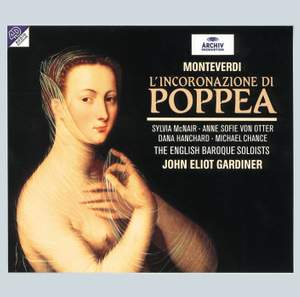Monteverdi: L'incoronazione di Poppea
Sylvia McNair, Anne Sofie von Otter, Dana Hanchard, Michael Chance
English Baroque Soloists, John Eliot Gardiner
The central question was always about how much needs to be added to the surviving notes in order to make Poppea viable on stage. Gardiner and his advisers believe that nothing needs adding and... — More…
Downloads
What are FLAC and MP3?Contents
Monteverdi: L'incoronazione di Poppea
Work length3:10:18
$34.85
$47.15
- Roberto Balconi (alto), Francesco Ellero D'Artegna (bass), Constanze Backes (soprano), Sylvia McNair (soprano), Noel Mann (bass), Marinella Pennicchi (soprano), Michael Chance (alto), Nigel Robson (tenor), Dana Hanchard (soprano), Bernarda Fink (contralto), Julian Clarkson (bass), Anne Sofie von Otter (mezzo-soprano), Mark Tucker (tenor), Catherine Bott (soprano)
- English Baroque Soloists
- Sir John Eliot Gardiner
- Recorded: 1993-12
- Recording Venue: Queen Elizabeth Hall, London
Sinfonia - Prologue - "Deh, nasconditi, o Virtù" ... (Fortuna, Virtù, Amore)
Track length7:04
$0.85
$1.15
E pur'io torno qui, qual linea al centro (Ottone)
Track length8:23
$0.85
$1.15
Chi parla? chi parla? (Soldato I, Ottone, Soldato II)
Track length3:36
$0.85
$1.15





